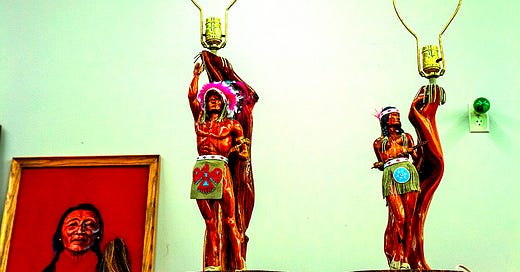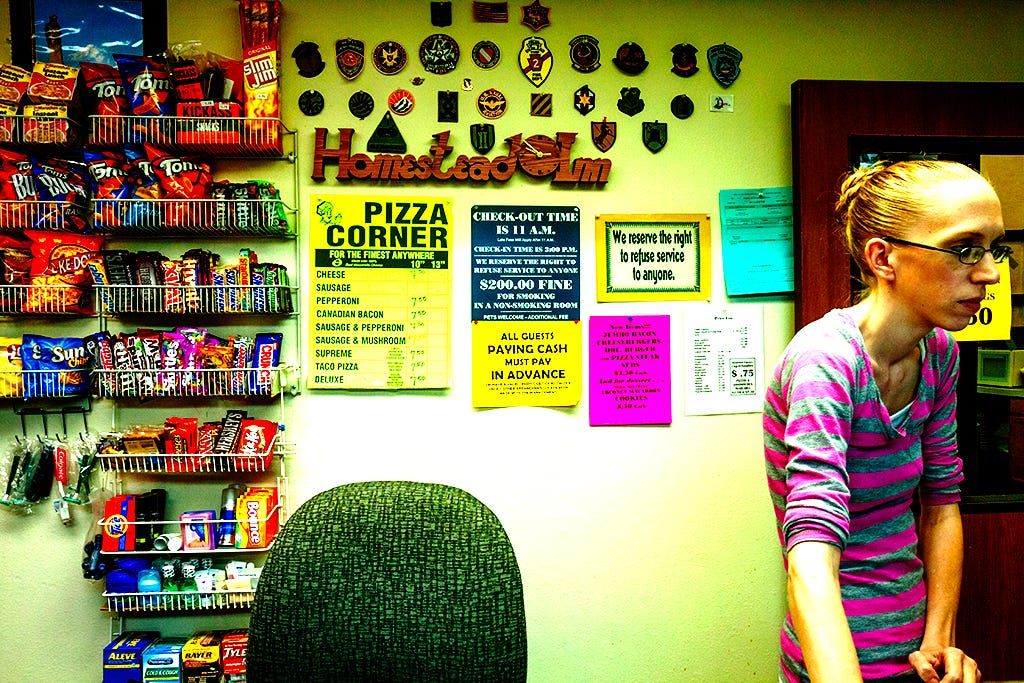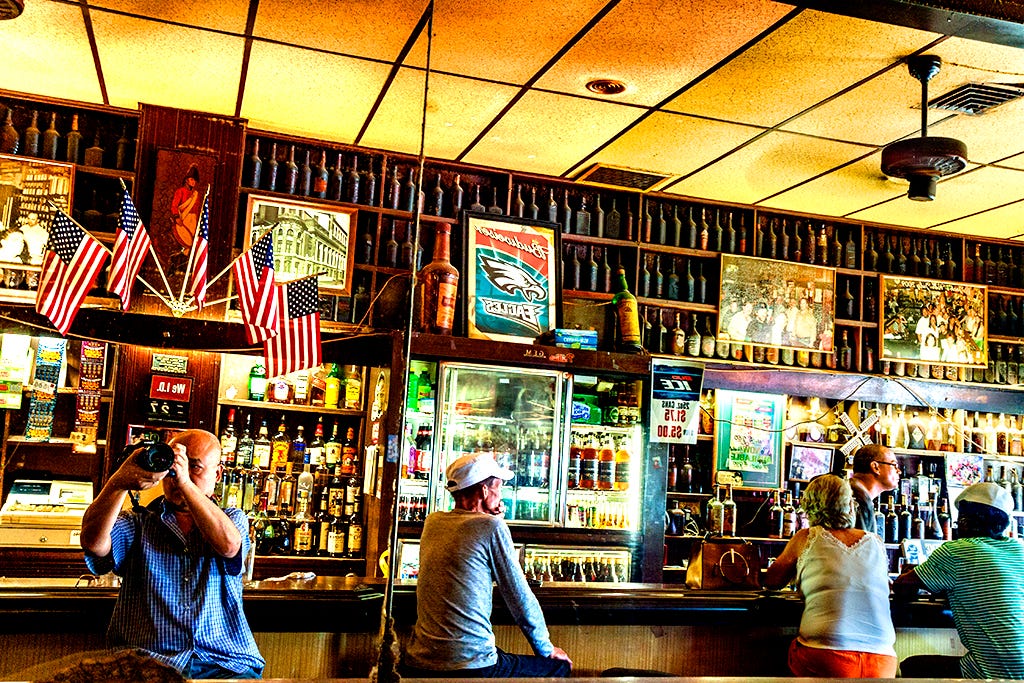[museum in Wolf Point, MT on 6/27/14]
This morning, I arrived at the café on General Uprising too early, so had to sit on a store step in the corner. In the semi darkness, I could hear a recorded Buddhist chant from some upstairs window. Hearing it must calm those lying in bed. Half dreaming, they’re gently jerked by those incomprehensible Pali words into thinking they’re already dead or, even better, overseas. Lost in a Kolkata alley without friends, language, Google Map or a single rupee, they’re liberated from all attachments. Certainly, you will own nothing and be happy. Only conspiracy theorists don’t think Klaus Schwab is the greatest guru ever.
At the bakery on Lê Lai, its shirtless owner with his pot belly could be seen. Vietnamese aren’t Greek gods or even black teenagers. He glanced at my darkened form. His ovens glowed.
Six or seven minutes into my shelterless discomfiture, I finally heard the café’s steel door rattling open, then the owner sweeping the sidewalk. Hidden by a bush, I couldn’t be detected. Had he swept further than usual, I would have been caught without an alibi. We’ve all been there. The red and green lights on the café’s sign blinked. Its white ones circulated clockwise.
Viet brooms are made from mangrove palm leaves, coconut shell fibers, baeckea frutescens branches, bamboo or straw. Irresponsible savages who resort to plastic must be sent to reeducation camps. In all Viet cities, they sweep nearly all day. Littering enables this soothing music. To appear nonchalant, I waited a minute before going to the café.
Pale face sits to my right. Sharing his table is a short, dark guy who confessed the other day to beating up Taiwanese on the street, in retaliation for China stealing Vietnamese islands.
“Taiwanese aren’t Chinese!”
Shortie just shrugged. They’re Chinese enough.
“Many Vietnamese live in Taiwan,” I continued. “What if they just beat us up?”
No answer.
“Did you send them to the hospital?”
“No, we just chased them,” so no blow was landed, probably.
This very street had many Chinese businesses before 1975, and even a Chinese School. Whatever it’s called, it’s now just General Uprising Elementary. Races have always been bumped from streets, neighborhoods, nations or even most of a continent. White neighborhoods across the US have been race replaced. Indians were booted from African nations. Greeks and Jews were chased from Egypt. Many German cities disappeared from Eastern Europe after WWII. Chinese are moving into Laos. As Chinese claim more of Prato, Italians flee. I remember walking into a Dunkin’ Donuts in the South Bay to find nearly every customer Vietnamese. Those raised in Orange County as late as the 70’s won’t recognize it now. Cambodians are nearly invisible in most of Kampuchea Krom. From the 1st to 7th century, all of southern Vietnam and quite a bit more was known as Funan, a Hindu civilization whose stories and poems are completely gone. It wasn’t that long ago. Even within a race, traumatic demographic displacements happen. In Leipzig, I heard complaints of Bavarians surging in. Only 2.38% of Taiwan are indigenous, but even among the “Han,” Fujianese and Hakkas who arrived centuries earlier resent those who came after 1949. Singaporeans and Hongkongers are bitching about crude mainlanders.
At this year’s Nottinghill Carnival, there were eight people stabbed, 334 arrested and 50 cops injured. It’s London’s multicultural showcase. Since 60 policemen were hurt in 2022, there’s an improvement, so let’s bump, grind, twerk, strut and stab away. I’m thrilled such festivities don’t exist in the Orient. Dancing badly has its advantage.
At some American restaurants and bars, you’ll see photos of celebrities who’ve patronized them, but at Jack’s Famous Bar in Philly, there were pictures of regular barflies going back decades. As the neighborhood, Kensington, became more deindustrialized and depressed, more black, brown and yellow faces appeared. Vietnamese ran nearly all the barbershops. More and more whites did return, but mostly as heroin, fentanyl and tranc junkies. Just before I left Philly in 2018, Jack’s was sold. Renovated to serve brave or foolish gentrifiers, its aura as after work destination for three factory shifts is gone.
As a kid in Saigon, I was charmed by Mạc Đĩnh Chi Cemetery. Founded as Cimetière Européen to inter French soldiers, mostly, it grew to host some very famous Vietnamese, such as President Ngô Đình Diệm and his brother, Ngô Đình Nhu, after they had been assassinated in Chợ Lớn, Saigon’s Chinatown. Also snug in Mạc Đĩnh Chi was Francis Garnier. As part of the Mekong Expedition of 1866-68, Garnier traveled 5,600 miles from Saigon through Cambodia, Laos, Thailand, Myanmar and Yunan to, finally, end up in Shanghai. Three-thousand-and-six-hundred of these miles were unknown to Europeans. Garnier was prominent enough an explorer to share an award with David Livingstone in Antwerp in 1869. Just four years later at age 34, Garnier was killed in Hanoi by the Black Flag, a Chinese army led by the legendary Liu Yongfu.
The most impressive tomb in Mạc Đĩnh Chi belonged to Nguyễn Văn Thinh. At the end of WWII, the French needed to buy time to reinstall themselves, so they tricked Thinh into setting up the République autonome de Cochinchine, with Vietnamese as ministers of treasury, justice, defense, security, agriculture, health, education, public works and home affairs. Sounded super impressive, except there was no budget or even one tiny building. Thinh ran this government from his doctor’s office. His minister of defense commanded not a single soldier. Realizing he’s been made a historical joke, Thinh pulled down a medical book, looked up “pendaison” then hanged himself.
Mạc Đĩnh Chi’s wealth of history was wiped out when it was converted into a park to mark the 10th anniversary of Communist tanks rolling into Saigon. Progressives love to erase, cancel and forget.
To me, the most intriguing inhabitant of Mạc Đĩnh Chi was captain Nicolas Barbé. Garrisoned at a Buddhist temple in Bến Tre, Barbé evicted not just its monks, but a gorgeous Buddha commissioned by the emperor Gia Long in 1804. High on his horse, Barbé was ambushed and decapitated one evening in 1860. His head was needed as proof to collect a reward. Mourning this loss, the French renamed the temple after Barbé and, this is most bizarre, used as his headstone the back of an elaborately inscribed one stolen just a year earlier. Meant for the mandarin Phạm Đăng Hưng, it was seized from a boat at Cần Giờ. Had Mạc Đĩnh Chi not been razed, tour guides could explain to tourists, “Écoutez! Here lies the headless captain Barbé under a stolen headstone. Alors! Now we can go get some hot dogs, pizza and French fries.”
To be remembered at all just months after death is already a big deal. In the still in print Histoire De L'expédition De Cochinchine En 1861, Barbé is mentioned several times. There’s this cool sentence, “Le capitaine Barbé était d’une taille et d’une force athlétiques, et tous les Annamites le connaissaient.” Captain Barbé had the size and strength of an athlete, and all Vietnamese knew this. Hardly, but such is language and story telling.
With buildings bombed, cemeteries razed and paintings slashed, we still have stories, though with words already fading or disfigured. Books are skimmed then abandoned after a few pages. Museums are visited only perfunctorily three or four times a lifetime.
In every community, there are still those trying to preserve. Visiting Wolf Point a decade ago, I was charmed by its tiny museum filled with banal objects. I had the entire space to myself. Distance or time increases the fascination with everything human. Even a broken toothpick will become nearly sacred.
Chased from more fertile land, the Sioux, Assiniboine and Chippewa of Wolf Point had been corraled into this desolate reservation where there wasn’t much to do but get shit faced. I met a man in a Hawaiian shirt with a knife scar across his belly. He couldn’t even grunt. I hung out with Alfred who had just been released from jail for raping his daughter. You tell them they haven’t been race displaced.
I wish I had more nights at Homestead Inn. The white receptionist had the most remarkable body. Her huge forehead suggested Dutch heritage. She had such a defeated posture, her chest appeared concave. She, too, had been displaced.
[Wolf Point, 6/27/14]
[Alfred and Kerri in Wolf Point, 6/27/14]
[Wolf Point, 6/25/14]
[Jack’s Famous Bar in Kensington, Philadelphia on 7/28/15]








This note on the postcard from Wolf Point is so telling.
https://linhdinhphotos.blogspot.com/2014/07/indian.html
"[S]o let’s bump, grind, twerk, strut and stab away. I’m thrilled such festivities don’t exist in the Orient. Dancing badly has its advantage."
Thank you--these cultural observations were what I needed this morning, along with my coffee and nicotine gum.